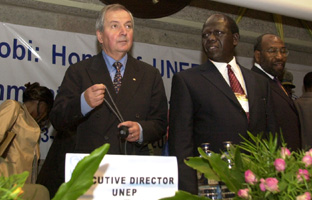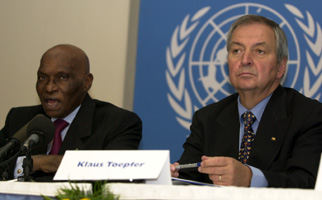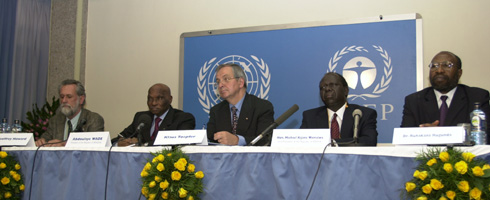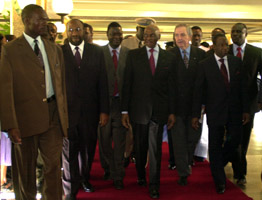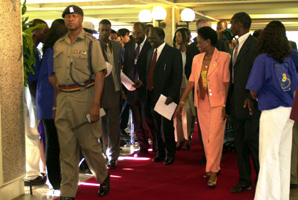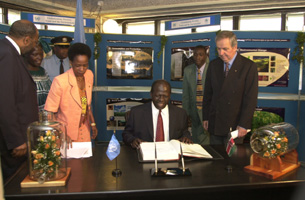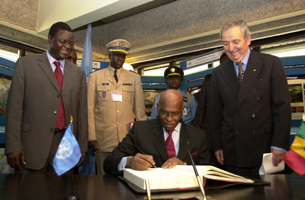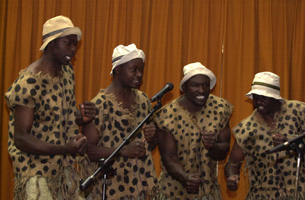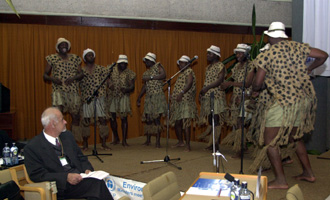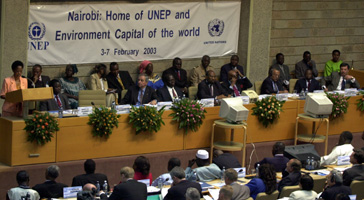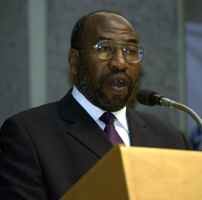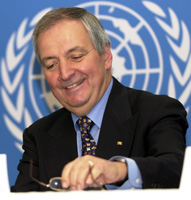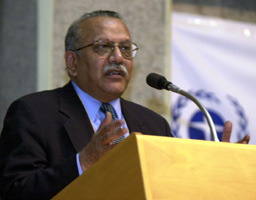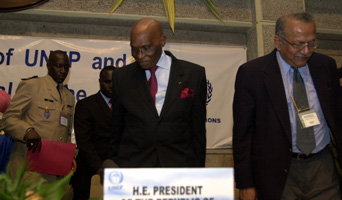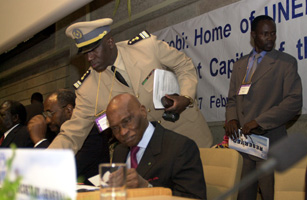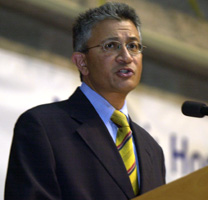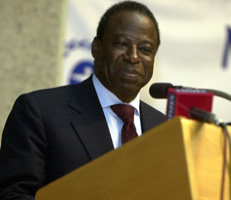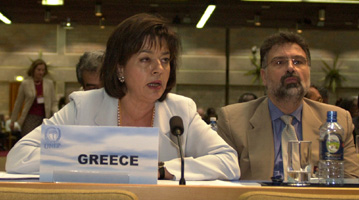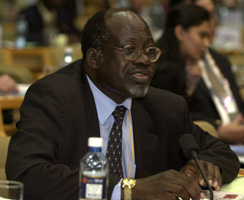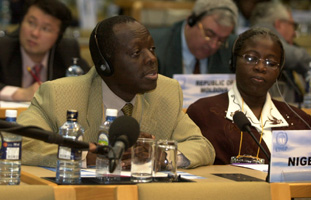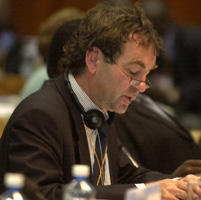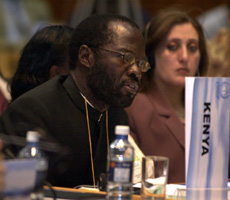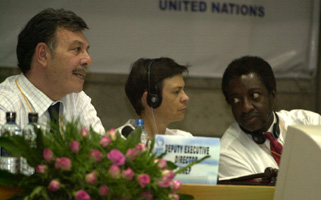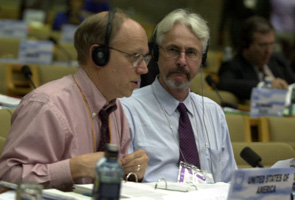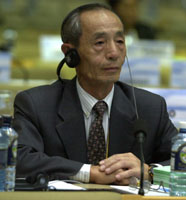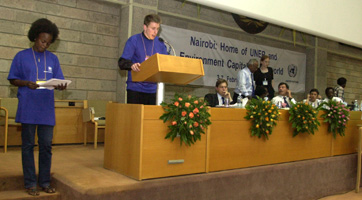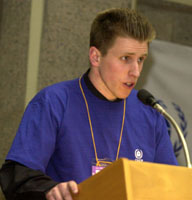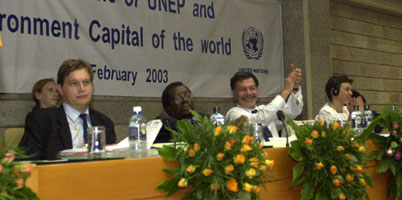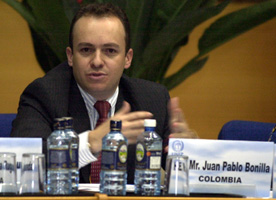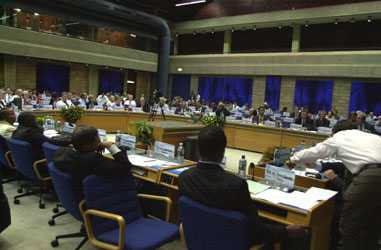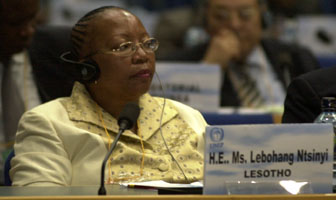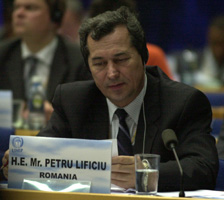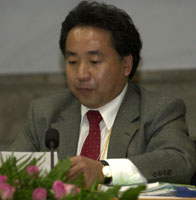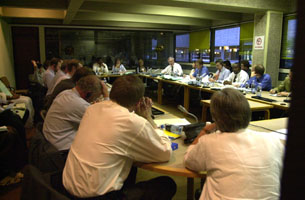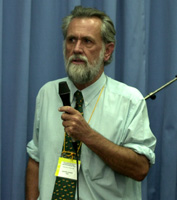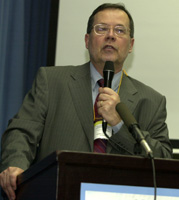|
Twenty Second Session
of the Governing Council/Global Ministerial Environment Forum Highlights from Wednesday, 5 February Photo: Klaus Topfer, UNEP Executive Director, Kenyan Planning and National Development Minister Anyang' Nyong'o and and Senegalese President Abdoulaye Wade (above) |
| UNEP Executive Director Klaus Töpfer Kenyan Vice-President Michael Wamalwa Kijana (left); Abdoulaye Wade, President of Senegal, UNEP Executive Director Klaus Töpfer (right) Below a Press Conference photo (left to right) Geoffry Howard, IUCN, Abdoulaye Wade, President of Senegal, UNEP Executive Director Klaus Töpfer Kenyan Vice-President Michael Wamalwa Kijana, and Governing Council President Ruhakana Rugund |
|
Opening of the Ministerial Consultations
|
|
Abdoulaye
Wade, President of Senegal (left) and Michael Wamalwa Kijana, Vice-President
of Kenya (right) enter the UN and sign the visitors' book
|
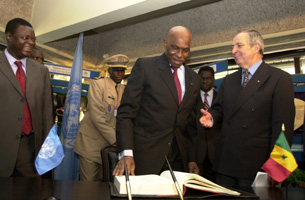 |
|
|
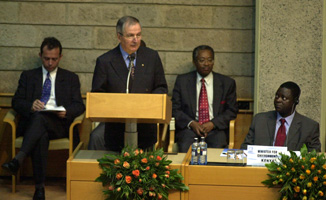 |
Seated to the right of Töpfer is Kenya's Envronment Minister Newton Kulundu |
|
|
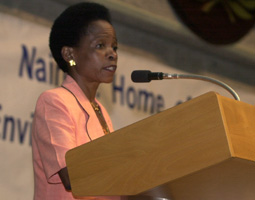 |
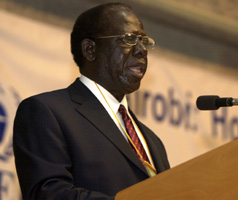 |
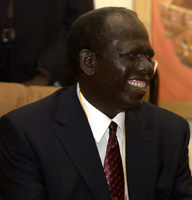 |
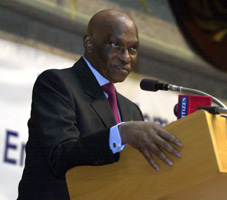 |
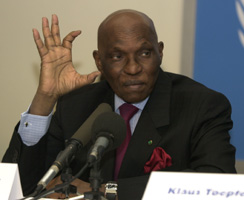 |
|
|
|
|
|
|
|
|
|
Nigeria
(left) and Senegal (right) emphasized the need for concrete action to
implement NEPAD.
|
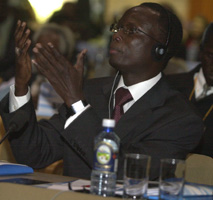 |
|
The Czech Republic (not pictured) stressed the importance of good governance, democracy, stability and respect for fundamental human rights, and questioned how strategic environmental assessments and environmental impact assessments would be factored into NEPAD initiatives. |
|
|
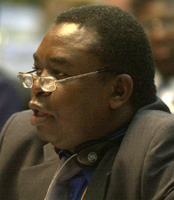
|
|
Committee
of the Whole
|
|
Kakakhel invited
delegates to consider policy issues relating to international environmental
governance, including: establishing universal membership of the Governing
Council; strengthening UNEP's scientific base and establishing an IPEC;
enhancing the engagement of civil society; strengthening UNEP financing;
improving coordination among MEAs; developing an intergovernmental strategic
plan for technology support and capacity building; and enhancing coordination
across the UN system and the Environmental Management Group (UNEP/GC/22/4,
UNEP/GC/22/4/Add.1 & UNEP/GC/22/4/Add.2). |
|
The
United States (left), Japan, Brazil and others opposed further consideration
of the IPEC proposal. The US, Japan, Brazil and others also opposed using
an indicative scale of contributions, while the EU supported the concept
as a means to increase burden sharing and the donor base
|
|
Norway (right), Canada, South Africa, and others said a contact group should be formed to further consider the IPEC proposal |
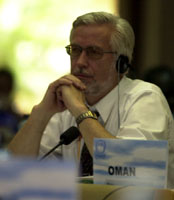
|
| China
insisted that contributions remain voluntary |
|
Youth
representatives Neema Mbeyu, Kenya, and Tomas Erust, Canada, made
statements regarding the importance of engaging youth in sustainable development
initiatives. They called for, inter alia, a legally binding instrument
on corporate responsibility, and the establishment of a youth unit at
the NEPAD secretariat.
|
|
Afternoon
Ministerial Consultations on UNEP's role in the regional implementation
of the WSSD's outcomes
|
|
Governing
Council Vice-President Juan Pablo Bonilla (Colombia) presided over the
afternoon Ministerial Consultations
|
|
Lebohang
Ntsinyi, Lesotho, and Petru Lificiu, Romania
|
|
Drafting
Group
|
|
Contact
Group on Budget
|
|
The
budget contact group reconvened on Wednesday morning to consider a revised
draft decision on the Environment Fund budgets, proposed biennial programme
and support budget for 2004-2005. The group failed to reach consensus
on text that would approve the proposed Programme of Work as outlined
in the Report of the Executive Director (UNEP/GC.22/6)
|
| BudgeEvening Panel Discussionon "Linkages between poverty and the environment |
|
Ministers
met in the evening to hear presentations from Economics
Professor Professor
of and Ashok Khoshla, Development Alternatives
|
|
IUCN Briefing
on the Fifth World Parks Congress and lauch of the IUCN-Ramsar Booklet
on Alien Invasive Species in Africa's Wetlands
|
|
Geoffrey Howard, IUCN, gave a brief overview of the World Parks Congress, which will take place from 8-17 September in Durban, South Africa. He noted that this will be the fifth Congress, that it takes place every ten years and that this is the first time that such a Congress will take place in Africa. He recalled that Nelson Mandela launched the Congress at the WSSD. He highlighted the Workshop Streams that will take place during the Congress on capacity building, gaps in the system, finance and resources, linkages between protected areas and surrounding land uses, raising awareness and strengthening support, governance, and management effectiveness. For more information, visit the IUCN World Parks Homepage |
|
Delmar Blasco, Secretary General, Ramsar Convention, launching the recent IUCN-Ramsar publication on Alien Invasive Species in Africa'a Wetlands This publication is available form the IUCN Eastern Africa Regional Office, email: mail@iucnearo.org |
|
Links
|
|
Back to Linkages home - Visit IISDnet
- Send e-mail to ENB |


